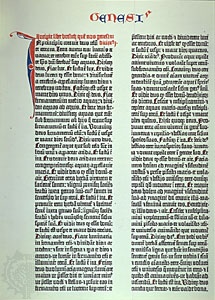Genesis
British rock group
 British progressive rock (art rock) group noted for their atmospheric sound in the 1970s and extremely popular albums and singles of the 1980s and '90s. The principal members were Peter Gabriel (Gabriel, Peter) (b. Feb. 13, 1950, Woking, Surrey, Eng.), Tony Banks (b. March 27, 1950, East Hoathly, East Sussex), Michael Rutherford (b. Oct. 2, 1950, Guildford, Surrey), Phil Collins (b. Jan. 31, 1951, London), and Steve Hackett (b. Feb. 12, 1950, London).
British progressive rock (art rock) group noted for their atmospheric sound in the 1970s and extremely popular albums and singles of the 1980s and '90s. The principal members were Peter Gabriel (Gabriel, Peter) (b. Feb. 13, 1950, Woking, Surrey, Eng.), Tony Banks (b. March 27, 1950, East Hoathly, East Sussex), Michael Rutherford (b. Oct. 2, 1950, Guildford, Surrey), Phil Collins (b. Jan. 31, 1951, London), and Steve Hackett (b. Feb. 12, 1950, London). Founded in 1967 by schoolmates at the Charterhouse public school, Genesis were first known for their songwriting talents and Gabriel's uniquely theatrical onstage performances. After their lineup stabilized with the addition of drummer Collins and guitarist Hackett in 1970, the group developed a style that featured heavy synthesizers and arrangements emphasizing group performance over the individual pyrotechnics favoured by many progressive rock groups. The band developed a dedicated following in the early 1970s; after the release of their acclaimed The Lamb Lies Down on Broadway (1974), Gabriel left to pursue a solo career. With Collins performing lead vocals, the band slowly developed a more mainstream sound marked by the successful albums Duke (1980), Abacab (1981), and Invisible Touch (1986) and scored a number of hit singles. Despite many successful side projects and the departure of Collins, the band continued to record with the 1997 release Calling All Stations.
Old Testament
Hebrew Bereshit (“In the Beginning”)
 the first book of the Old Testament. Its name derives from the opening words: “In the beginning….” Genesis narrates the primeval history of the world (chapters 1–11) and the patriarchal history of the Israelite people (chapters 12–50). The primeval history includes the familiar stories of the Creation, the Garden of Eden, Cain and Abel, Noah and the Flood, and the Tower of Babel. The patriarchal history begins with the divine promise to Abraham that “I will make of you a great nation” (12:2) and tells the stories of Abraham (chapters 12–25) and his descendants: Isaac and his twin sons Jacob and Esau (chapters 26–36) and Jacob's family, the principal figure being Joseph (chapters 37–50), whose story tells how the Israelites came to be in Egypt. Their deliverance is narrated in the following book of Exodus. Genesis must thus be seen as a part of a larger unit of material traditionally understood to comprise the first five books of the Bible, called the Torah, or Pentateuch.
the first book of the Old Testament. Its name derives from the opening words: “In the beginning….” Genesis narrates the primeval history of the world (chapters 1–11) and the patriarchal history of the Israelite people (chapters 12–50). The primeval history includes the familiar stories of the Creation, the Garden of Eden, Cain and Abel, Noah and the Flood, and the Tower of Babel. The patriarchal history begins with the divine promise to Abraham that “I will make of you a great nation” (12:2) and tells the stories of Abraham (chapters 12–25) and his descendants: Isaac and his twin sons Jacob and Esau (chapters 26–36) and Jacob's family, the principal figure being Joseph (chapters 37–50), whose story tells how the Israelites came to be in Egypt. Their deliverance is narrated in the following book of Exodus. Genesis must thus be seen as a part of a larger unit of material traditionally understood to comprise the first five books of the Bible, called the Torah, or Pentateuch.Scholars have identified three literary traditions in Genesis, as in Deuteronomy, usually identified as the Yahwist, Elohist, and Priestly strains. The Yahwist strain, so called because it used the name Yahweh (Jehovah) for God, is a Judaean rendition of the sacred story, perhaps written as early as 950 BC. The Elohist (Elohist source) strain, which designates God as Elohim, is traceable to the northern kingdom of Israel and was written 900–700 BC. The Priestly (Priestly code) strain, so called because of its cultic interests and regulations for priests, is usually dated in the 5th century BC and is regarded as the law upon which Ezra and Nehemiah based their reform. Because each of these strains preserves materials much older than the time of their incorporation into a written work, Genesis contains extremely old oral and written traditions.
- Mary Ellen Mark
- Mary Emma Woolley
- Mary Fitton
- Mary Frances Clarke
- Mary Garden
- Mary Gordon
- Mary Gove Nichols
- Mary Gregory glass
- Mary Hannah Fulton
- Mary Hannah Hanchett Hunt
- Mary Hayden Green Pike
- Mary Henderson Eastman
- Mary Henrietta Kingsley
- Mary Herbert, countess of Pembroke
- Mary Herbert Pembroke, countess of
- Mary I
- Mary II
- Mary Immaculate, Oblates of
- Mary Jane Rathbun
- Mary Jane Safford
- Mary J. Blige
- Mary Jemison
- Mary Joseph Rogers
- Mary Katherine Goddard
- Mary Kathleen